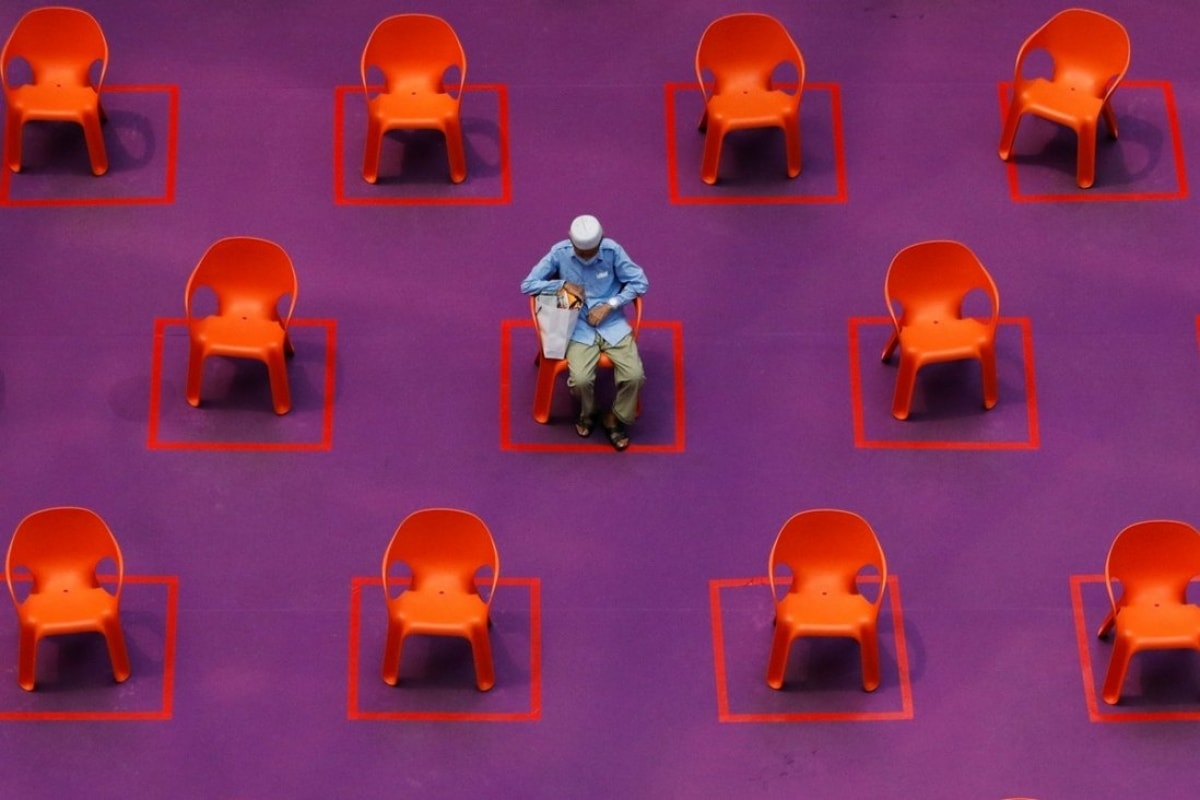Experts debate what solutions to living with Covid-19?
There is a heated debate around the world about whether the way to "escape" the pandemic is "No Covid" or "Living with Covid". The question is whether there is a solution that can both prevent Covid-19 and still allow us to return to normal life?
Two views on how to "escape" Covid-19
Singapore is one of the countries with the highest rate ofvaccinationThe highest in the world, over 80%. Thanks to this result, the "lion island" tried to open up and return to normal life. However, the number of Covid-19 cases has recently increased faster than expected, hospitals are starting to feel the impact and restrictions are being reimposed.
 |
| A man sits among empty seats at a free movie theater in Singapore on September 29 as restrictions were tightened due to a rise in Covid-19 cases. Photo: Reuters |
Around the world, there is a fierce debate between two schools of thought on how to "escape" the pandemic.
On one side are those who advocate the elimination strategy.Covid-19. They point to China as an example to argue that the safest way to deal with Covid-19 is to eliminate it. They argue that lockdowns and quarantines are the best way to keep people safe. They also point out that economies in countries that choose to eliminate Covid-19 generally grow faster than those that choose to mitigate the impact of Covid-19. They argue that the threat of new variants and long Covid-19 is not fully understood.
On the other side are the reopening advocates, who argue that because vaccines protect most people from severe symptoms, allowing the Delta variant to spread is acceptable. They point to countries with high vaccination rates in Europe that have lifted restrictions without a spike in deaths. They also argue that restricting travel and social activities would be unnecessarily damaging to society, mental health, and the economy.
Both camps have their merits. But what if we could combine the two? What if we could stop Covid-19 and get back to normal life at the same time? Some experts believe this could be done through at-home testing.
Rapid home testing
In the early days of the Covid-19 pandemic, the World Health Organization (WHO) urged the world to “test, test, test”. By detecting and isolating cases, the chain of infection could be broken. PCR testing was widely implemented. Later, another testing method became popular around the world: the rapid antigen test (ART). ART kits to detect Covid-19 do not require special techniques: 1 line is negative and 2 lines are positive.
Dr. Michael Mina, professor of epidemiology at Harvard University TH Chan School of Public Health in the US, has advocated the widespread and frequent use of ART because it can break the chain of Covid-19 transmission. He listed three important strengths of ART.
First, ART tests can reliably detect whether someone is infectious, a period lasting about a week when they carry millions of viral particles. This period of high viral load is when ART is most sensitive, making it a near-ideal tool for people to determine when they are infectious.
Critics of ART argue that PCR tests are more sensitive, but this only applies to detecting residual RNA in non-infectious cases. Data from a study by British scientists showed that ART is about 97% sensitive to infections, even pre-symptomatic cases.
That means, with rapid testing, individuals who test positive can know when they need to stay home in isolation while those who test negative can feel free to continue their lives.
Second, ART testing is very fast. The Delta variant can be transmitted 1-2 days earlier than the original virus strain, surpassing the speed of PCR tests, which take several days to return results. ART testing can tell people if they are at risk of infection in as little as 20 minutes, beating the transmission speed of the Delta variant.
Third, ART testing technology makes it suitable for mass production at low cost. ART is most effective when everyone can get tested. Infections are slower when ART is widely and frequently used. Therefore, disease control will be more effective if ART tests are low cost or, ideally, free.
In fact, some European countries have already seen low-cost ART testing as an effective tool in their reopening strategies. In Germany, authorities have approved dozens of different ART brands that cost less than 2 euros (about $2.31). In the UK, households can order a free 7-day test pack for daily testing or pick it up from local facilities.
However, countries like the US and Singapore are lagging behind in increasing ART capacity. The US strictly regulates ART as a medical device, so it is only available over the counter, leading to high costs and shortages. US President Joe Biden is moving to change this by invoking the US Defense Production Act to increase production and directly purchase millions of test kits.
Singapore has a clever approach to using ART combined with automated contact tracing, where close contacts receive free test kits and are tested daily for a week in case they test positive. However, adoption of at-home ART in Singapore has been relatively slow, with only eight brands of ART approved so far, and the price remains high at around $7.30 per test.
A study in the United States found that if a test kit were available for $1, about 79% of participants would use ART regularly. The low cost also makes it easier for governments and employers to distribute free test kits to citizens and employees.
Whatever we do now is preparing for the next wave of variants or future pandemics. Self-testing could become as easy as brushing your teeth. When that happens, we will see that the pandemic can be stopped with a new measure: rapid mass testing./.

